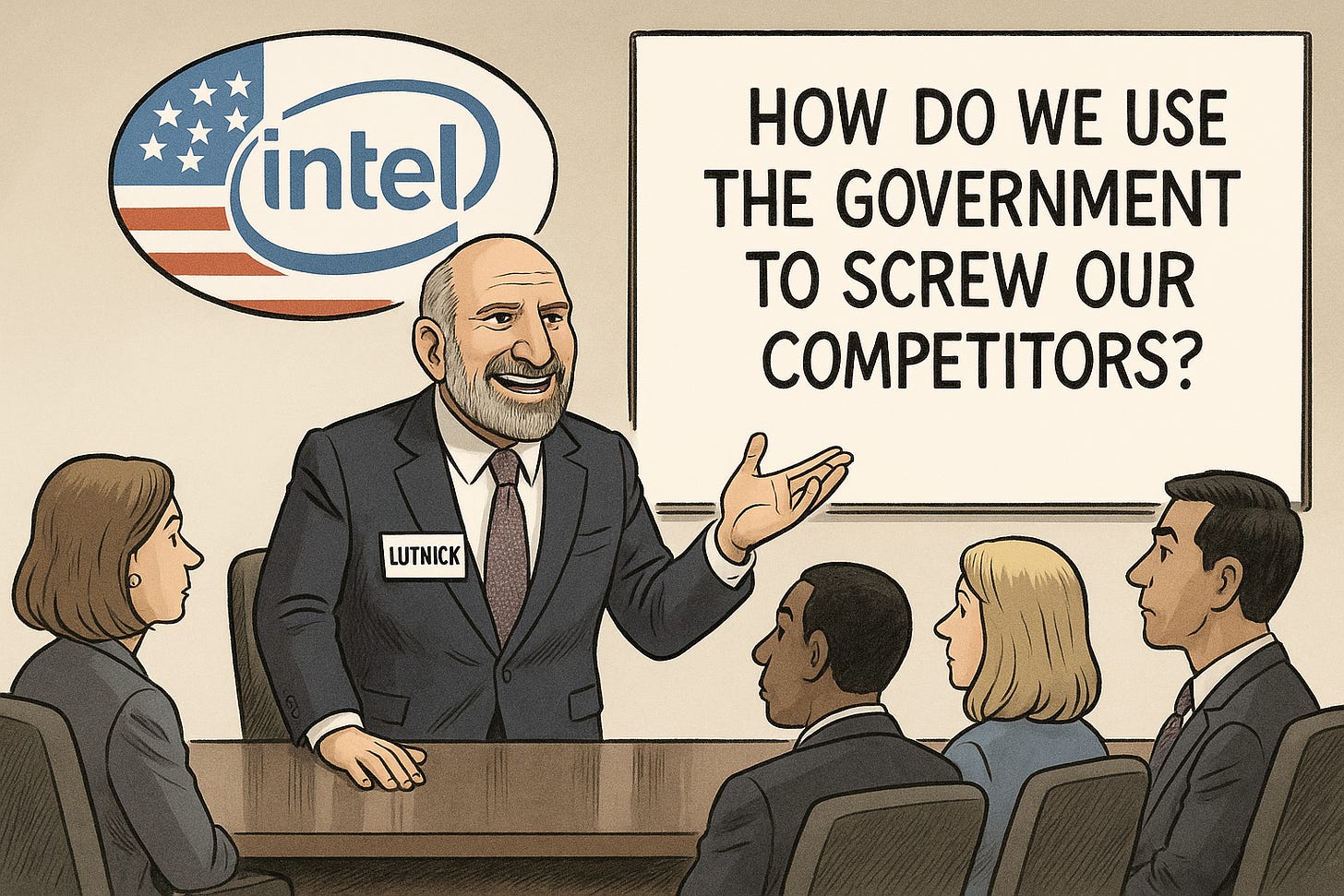Washington’s Intel Power Grab: Government Has No Place in the Boardroom
The federal government’s $8.9 billion stake in Intel marks a dangerous precedent of state ownership in private enterprise, risking debt, distortion, and cronyism.
The Proper Role of Government
The Founders did not intend for government to own businesses or dictate markets. James Madison reminded us in Federalist No. 45, that"The powers delegated by the proposed Constitution to the federal government are few and defined…” No where in the Constitution is the role of government defined as having ownership in private, for profit businesses. Government is supposed to be the referee, not a player on the field. Once Washington becomes both regulator and shareholder, impartiality is lost and cronyism takes root.
Borrowing to Play Investor
Instead of investing from surplus revenues, Washington is financing its new role as investor with borrowed money, adding to a $37 trillion national debt. This is not hypothetical—it’s a pattern we’ve seen before.
Think of Fannie Mae and Freddie Mac. They were designed to stabilize housing finance, but government backing encouraged risk without accountability. Their collapse in 2008 helped trigger a global financial crisis, leaving taxpayers with a massive bailout bill. When government mixes regulation with ownership, the system bends toward excess and eventually breaks.
Or consider Amtrak. Since the 1970s, it has absorbed tens of billions in taxpayer subsidies. Rather than becoming efficient, it became a permanent ward of the state—never disciplined by competition, never free to fail, and never forced to innovate. That is what happens when government decides to “invest” instead of allowing markets to work.
Thomas Jefferson’s warning, from his 1788 letter to Edward Carrington still rings true, “The natural progress of things is for liberty to yield, and government to gain ground.”
Politics in the Boardroom
When government holds equity, companies face a dual mandate: innovate for customers while also satisfying politicians. Intel will now face pressure not only to compete globally but also to serve political ends—like job guarantees or symbolic “national security” gestures.
History shows how destructive this can be. Venezuela’s state-run oil giant, PDVSA, collapsed under political meddling despite vast natural wealth. Closer to home, the U.S. housing system collapsed under the weight of government-sponsored entities like Fannie and Freddie. Creativity and accountability are the first casualties when politics invades the boardroom.
The Cronyism Slippery Slope
Government stakes tilt the field toward the politically connected. If Intel is rewarded today and defense contractors tomorrow, entrepreneurs will conclude that political pull matters more than innovation. Capital will chase government favors instead of fresh ideas.
We’ve seen this movie before. Solyndra, armed with $535 million in federal backing, collapsed into bankruptcy. The lesson was not just economic waste—it was political favoritism substituting for market discipline.
“Government has a role to play in a free market economy, but that role is not to pick winners and losers.” — Economist Arthur Laffer
So, Does It Matter?
Absolutely. Washington’s entry into equity ownership doesn’t just risk adding debt or stifling competition—it undermines the constitutional principle of limited government. The federal role is to protect liberty, not to buy corporate board seats.
If national security requires action, the proper tool is transparent procurement contracts, or direct and visible actions against a bad actor working against the just interests of our national security —not hidden ownership stakes. Markets flourish when they are free. Our prosperity depends on competition shaped by citizens’ choices, not by government dictates.
The more powers government assumes that were never intended for it, the more it endangers both liberty and prosperity. A free people must insist that government stay in its lane—protecting our rights, not running our businesses.
Editorial Note: I agree with a whole lot that the Trump Administration is doing. Enthusiastically so. But I believe at my core in a limited role for our federal government in our society. It is clear that in some areas the President does not share that perspective. I am not “Anti-Trump” - voting for him was an easy decision last year. But I also will not shy away from my own core beliefs as a constitutional conservative, calling balls and strikes.
Below the paywall for morning posts is always something extra for our paid subscribers… In this case it’s three other cartoons that I almost used for this column.
Take the plunge, become a paid subscriber - and take advantage of the huge discount available now. $5/mo or $50/year. Every week as free subscriber you will always get plenty of content. But between 30% - 40% of our best stuff is reserved for the paid tier. I did the math, and you end up spending around seven cents each time you get paid content. Now that is a deal… How could you not want to read the rest of this analysis for less than a dime? Join a huge number of your former freebies, and upgrade!
Keep reading with a 7-day free trial
Subscribe to FlashReport Presents: So, Does It Matter? On CA Politics! to keep reading this post and get 7 days of free access to the full post archives.



